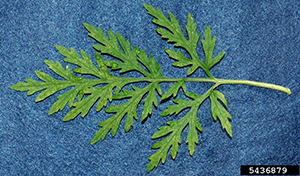National Forum on Climate and Pests
 |
|
Common ragweed, Ambrosia artemisiifolia. Source: Bruce Ackley, The Ohio State University, Bugwood.org |
The climate is changing and the evidence is all around us. Springs are arriving earlier, summers are longer and hotter, winter temperatures are warmer, and plant hardiness zones have shifted northward.
Weeds, insects, and diseases have always had an impact on agriculture and forestry ecosystems, but with recent changes in climate, these could become more significant. Many pests are resilient under normal conditions, but with climate change they could adapt and become a more difficult challenge.
What is increasingly being studied, but still not fully understood is the distribution of pests, changes in cycles, and the resulting impacts on the environment, economies, and society and culture.
Therefore, the Northeastern IPM Center, together with scientific partners, have proposed to hold a National Forum on Climate and Pests. Its purpose will be to gather those in the scientific community who are working in this area.
Please see the National Forum on Climate and Pests webpage for more details and to sign up for the mailing list.
— by CHRIS GONZALES
The Northeastern IPM Center promotes integrated pest management for reducing risks to human health and the environment. If republishing our news, please acknowledge the source (“From Northeast IPM Insights”) along with a link to our website.
